#And he is also the one whose canon art I purposefully ignore the most
Text
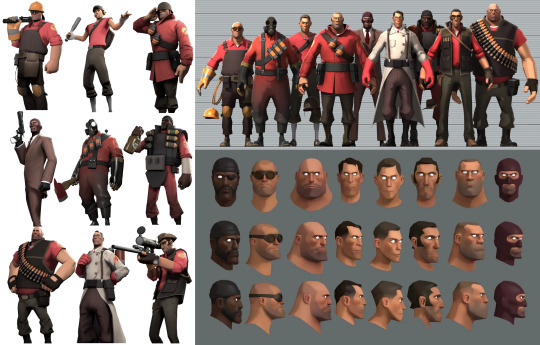
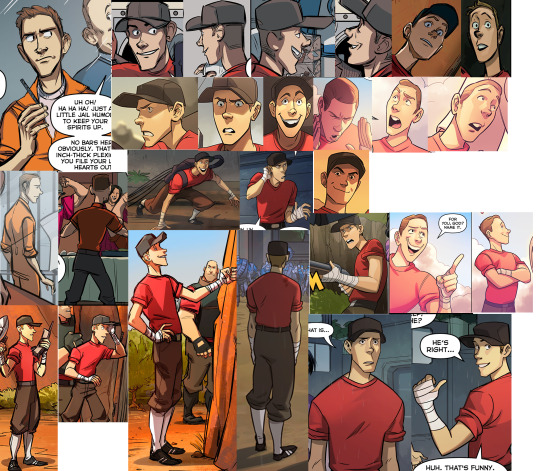
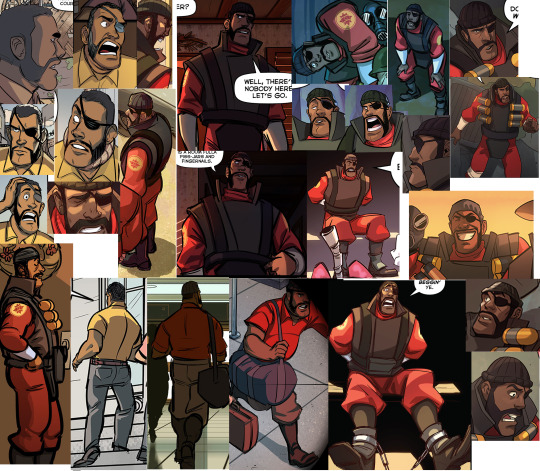

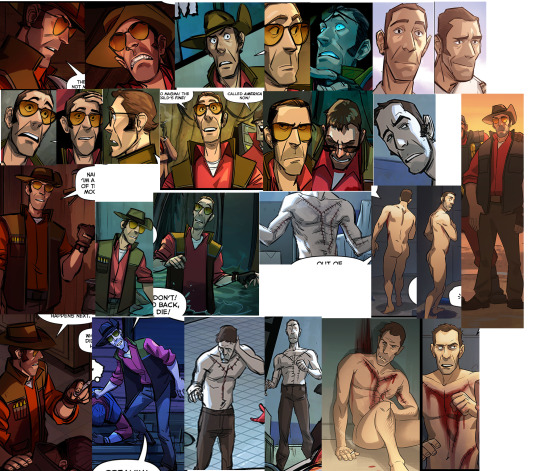
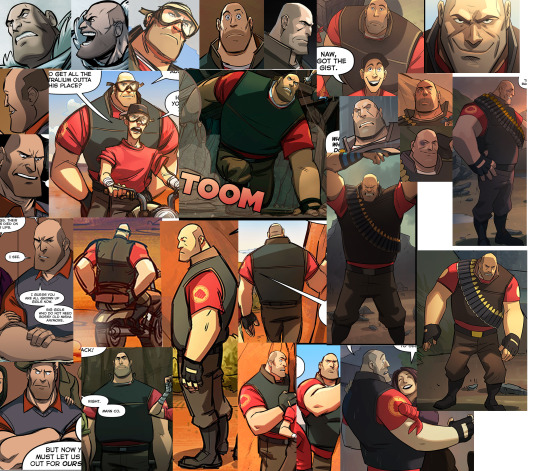
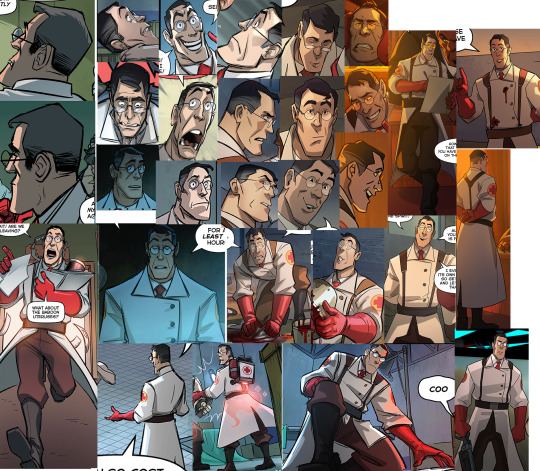

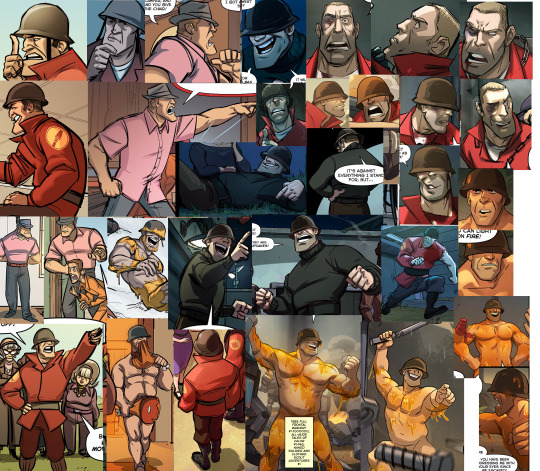
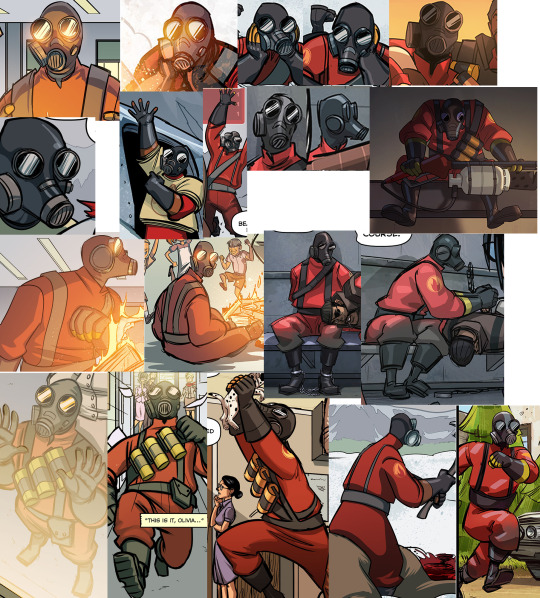
hey do you guys want some references. Because brother I have some fucking references for you.
#You have no IDEA how many times I clicked through the comics.#if I were a worse off person it might’ve driven me insane but luckily I have adhd so this has just been like a type of therapy to me#tf2#tf2 reference#Long post#Engie is the only one here with references pulled from multiple comics because of how little he pops up in the official series#And he is also the one whose canon art I purposefully ignore the most#he’s like 5’4” in my heart. Forever.#that blank head turn on the 3d model refs was just pulled from an article so. Let me know if I accidentally stole from someone or smth
6K notes
·
View notes
Text
yknow, even though I think most of what Matrick Patthew said in his new video is one big steaming pile of doodoo there are a couple things I must give him credit for. (1) he did point out that Frank is often the “odd one out” which I’ve thought about since he’s the only one besides Wally who wasn’t given an origin before moving to Home, he doesn’t follow the pattern of having a name ending in “y” or “ie”, etc.
(2) something I hadn’t thought about. what exactly the upside-down clothespin means. I do think it’s fair to assume they represent the neighbors since there’s 9 of them. MP thought it might be Frank since he’s an outlier even though it doesn’t go with the “buried head in the sand” theory, or Wally. I think the latter is more plausible because, if this is a story about Home seeming like a utopia while something sinister is beneath the surface, then Wally is probably the only one who knows about the neighborhood’s flaws but refuses to acknowledge them. it could be ironic that Wally is the only one aware but also purposefully ignorant. BUT there are 9 clothespins and neighbors, which means Home has to represent one of them and Home is likely just as aware as Wally, if not more so.
I think there is a more likely culprit. MP compared the clothespin to Frank since Frank’s main color seems to be blue—that’s just flat-out wrong. the neighbor’s favorite colors are shown multiple times (the color buttons on the phone, the color of their names) and Frank’s color is yellow. Barnaby’s color is blue.
which got me thinking, even if the color thing is just a coincidence, the clothespin might represent Barnaby. my first reason is flimsy at best since it’s based on non-canon art, but the art that has Wally with a headless Barnaby is an interesting parallel since both Barnaby and the clothespin have no visible head. I think everyone assumes Wally is doing something sinister in this art but that’s not true. Barnaby had a walk-around puppet since he’s so tall so Wally’s just with his puppet before the head’s been put on (albeit looking very creepy haha). Barnaby’s head is discarded somewhere on the floor behind them which is a funny similarity to the clothespin’s head being in the dirt.
my other reasoning is better, and that’s Barnaby being Wally’s best bud. he’s closer to Wally than anyone else in the neighborhood, besides maybe Home. I’ve seen others say this, but since Barnaby is Wally’s best friend he’s probably been witness to a lot of Wally’s strange behavior that points to his sentience. and the last video shows this when Wally spaces out again and Barnaby takes notice while trying to snap him out of it.
I think if there is something sinister going on and it revolves around Wally and Home, Barnaby would be the first to realize it. he could be the clothespin burying his head in the sand to pretend like nothing’s happening, or Barnaby could the first victim of whatever it is. I don’t think that means foul play yet (how would puppets even die, especially when there are multiples of them?) so I’m not sure what “it” is but Barnaby’s fur pattern does match the patch on Wally’s chair, he was the only character whose sticker was clickable pre-July update, and his favorite color matches the color of the clothespin, and I think it could all mean something.
(I also think it’s interesting about the rotting stuff in the garden since I thought food didn’t rot in Home, but that’s another story entirely.)
12 notes
·
View notes
Text
Assorted thoughts on “Little Women”
In no particular order.
*I’m glad I waited this long to read the original, unabridged novel. If I had read it as a teen or a preteen, I just might have followed countless girl readers’ example of having a crush on Laurie and being angry that Jo doesn’t marry him. Reading it now, I’m able to see him as the well-rounded, likable yet flawed character he is, not just as a girl’s prize, and realize that while he and Jo have a beautiful friendship, they wouldn’t have worked as a couple. The canon pairings of Jo/Friedrich and Amy/Laurie are the right ones.
*About the controversial issue of the characters’ ambitions... None of the young leads achieve their childhood dreams in the end; Alcott’s intended message was clearly “We don’t always achieve our dreams, but life can still be happy in ways we never expected.” That’s all well and good. But apart from Meg’s gender-neutral dream of being rich, the characters’ “castles in the air” are all in defiance of their expected gender roles: Jo wants to be a famous author and Amy a famous artist, two fields normally reserved for men, while Laurie wants to be a composer instead of going into his grandfather’s business. And all three of their endings are distinctly more gender-conforming: Jo becomes a schoolmistress, Amy becomes a society lady, both become wives and mothers, and Laurie goes into business “like a man.” I think it’s fair for modern readers to be disappointed by that conformity, even while appreciating the realistic message about childhood dreams. Those feelings aren’t mutually exclusive. For modern audiences, I think the standard adaptational change of Jo publishing her own version of Little Women at the end (instead of 20 years later in the last sequel) is a good change.
*About Jo needing to control her temper... I understand why this annoys some feminists. So often women are expected to suppress all anger and never stand up for themselves. Maybe it is problematic that role model Marmee explicitly never shows her anger, but only purses her lips and leaves the room. But personally, I think it’s presented in a healthy, gender-neutral way. Jo’s anger isn’t a problem because it’s “unseemly” or “unfeminine,” but because it can lead her to do cruel things to others. The mistake that teaches her the lesson in “Jo Meets Appolyon,” letting Amy skate on the thin ice, isn’t a loud, aggressive act of rage, but a cold, silent act (or rather inaction) of spite. Besides “control your temper” doesn’t mean “never stand up for yourself.” The book has several examples of women calmly yet firmly calling out other people’s bad behavior (most often Laurie’s ^–^) and it’s portrayed as entirely right. And though it’s tempting to be annoyed by Mr. March putting his finger to his lips when he sees his wife starting to get angry, it’s also a nice subversion of gender stereotypes to see a marriage where the husband is gentler by nature than his wife and is a calming influence on her. Stereotypical couples are the other way around.
*As a person on the autism spectrum, I relate strongly to Beth. I fully embrace the headcanon that Beth herself is autistic and that Lizzie Alcott might have been diagnosed as such if she had lived today. So it hurts a little to see other readers call Beth “boring,” “annoying,” a “doormat” and “the worst of the sisters.” Although she is idealized because she was Alcott’s tribute to her dead little sister, she’s not the cardboard cutout of bland feminine virtue she’s so often been stereotyped as being. It’s clear from the start that Beth isn’t “normal,” either by our standards or by past ones. Her crippling shyness isn’t just “sweet Victorian modesty,” but portrayed as a real flaw that she struggles to overcome. She’s been homeschooled because as a child her social anxiety made regular school unbearable for her. She still plays with dolls, believes in Santa Claus and has imaginary friends at age 13. She has no desire to get married, or to have any kind of career, or ever to leave her parents’ house. And because of all this, she clearly has a low opinion of herself: hence she tells Jo that she was never meant to live long, because she would never have been anything but “stupid little Beth, trotting about at home.” But the narrative belies her words. In both of her illnesses, so many people rally around her and reveal how much they love her and how valuable her quiet kindness has been in their lives. Ultimately she dies in peace because she realizes her life hasn’t been worthless after all. With my own social struggles, my tendency to be “younger than my years,” and my own desire to have a quiet life close to my family instead of going out into the big, overwhelming world and doing big, overwhelming things, I find her storyline beautiful, because it gives me hope that my life is just as valuable as anyone else’s.
*I also relate to Jo, as so many readers do. The result is that I’m of two minds of the chapters “Calls” and “Consequences.” On the one hand, there’s no doubt that Jo is at fault in those chapters and does more-or-less deserves to lose the trip to Europe. She’s genuinely, purposefully rude to her aunts and to the other people they visit and she humiliates Amy and harms her social life – at the subsequent fair, the Chesters ban Amy from the art table because Jo insulted them. Plus the only reason why she has to join Amy in the calls in the first place is because she promised she would, so it’s hypocritical of her to whine about it. But on the other hand, I do empathize with Jo. With my own my social difficulties, I relate to her hating formal occasions where she has to dress up, mind her manners, make small talk about topics that don’t interest her with people she dislikes, and always be “agreeable” and “docile.” For Jo and for so many of us, it’s so hard to be that way, yet it’s the mold that all women were expected to stuff themselves into in the 19th century and to an extent still are today. Amy is lucky that she enjoys playing that social game and that it comes naturally to her. So it’s easy to sympathize with Jo’s envy when Amy is chosen to go to Europe, to feel as if Amy is rewarded for her social conformity while Jo is punished for failing to conform, and to feel as if the message is that all girls should conform like Amy. Fortunately, the book as a whole doesn’t send that message: even Amy achieves her ultimate happiness by letting herself be a bit more like Jo and call Laurie out on his laziness and apathy, when back in “Calls” she had argued that a lady should never show disapproval to a man.
*I don’t understand why some commentators think the chapter “On the Shelf” is so horribly sexist. Well, actually, I do. It’s tempting to find fault with John for being “jealous” that Meg is focusing more on their babies than on him and for “neglecting” Meg and spending carefree evenings out while she slaves away with the twins. And for Meg to be told by her mother that this is her own fault for “neglecting her duty to her husband” understandably rankles some feminists. But I honestly don’t think there’s any real problem. Meg genuinely neglects John and overtaxes herself by devoting every waking minute to the twins and letting neither John nor anyone else help her, because she’s afraid that otherwise she’ll be a bad mother. John isn’t jealous of the babies, he understandably feels ignored and useless. Nor (despite what some critics think) does he cheat on Meg, or want to. He just goes to a friend’s house rather than sit alone at home; Meg’s fear that his eye is roving to Mrs. Scott is just a product of her own stress. The resolution is arguably just the opposite of sexist: Meg finally lets John take an equal share of child-rearing duties, lets Hannah babysit often so they can both have time for themselves too, and steps out of her domestic sphere to share talks with John about politics, literature, etc. By the end of the chapter, their marriage is more egalitarian than ever.
*I’d like to read a fanfic where Jo meets Rodolfo from La Bohéme. I wouldn’t ship them, since they’re even more “too much alike” than Jo and Laurie are, but I’d like to see them meet. They’re both lively, passionate, temperamental ENFP writers, whose minds are full of “castles in the air” (they both use that exact phrase), yet whose lives both turn out differently than they had hoped, although Jo’s outcome is much happier. Both also adore a sweet, gentle, sickly young girl (Jo’s sister Beth/Rodolfo’s love interest Mimí) whose death they both regard as the end of their own youth. Furthermore, both of their authors modeled them after themselves. Jo is more down-to-earth than Rodolfo, though, and I’m not sure if they’d be friends or hate each other – Jo would definitely be indignant to learn how Rodolfo emotionally abused and broke up with Mimí because he couldn’t bear to watch her die, when she herself nursed Beth day and night through both of her illnesses and never left her side. But it would be an interesting meeting.
@fairychamber, @thatvermilionflycatcher
44 notes
·
View notes
Text
“Anybody can become angry, that is easy; but to be angry with the right person, and to the right degree, and at the right time, and for the right purpose, and in the right way, that is not within everybody’s power, that is not easy.” - Aristotle, The Art of Rhetoric
Well, look at that ancient Greek dude rolling out a pitch-perfect summary of - what I currently consider to be - Liz’s core issue on TBL. My core issue is that I cannot keep things brief, so I’ll poke this some more bc damn S5 was so much better than I expected, and it left me with an urge to try and sort this canon mess into sth I can swallow.
What’s the deal with Liz, why is her relationship with Red in such a terrible shape at the end of S5, and why is that a likely promise of better things to come?
It’s possible to look at this deterioration as a more or less continuous (organic!) process that reaches back at the very beginning; a process to which both characters have contributed their fair share over the years and now they are reaping the consequences and setting themselves up for a potentially healing collision.
I. Liz has narcissistic traits. Red is a natural born charmer with closely-guarded secrets and a pervasive guilt-complex. Putting them together is like putting mints in a bottle of coke: even on a perfect sunny day it's the kind of fun that leaves a mess.
II. Liz’s traits are amplified by Red’s behavior and Red’s behavior is warped by Tom’s presence. When Red scales things back (i.e. stops going on guilt-trips whenever others don’t feel like facing the consequences of their actions), it only makes things worse. This is the dark side of their intense "lock and key" dynamic, the deep angst pit that has been fore-fronted since S3B due to a rapid sequence of betrayals Red suffers from those closest to him. Tom triggers both empathy and repulsion in him, which in turn feeds his self-hatred and prompts him to keep enabling Liz out of guilt, creating an unsustainable bubble that finally bursts in S5.
III. The current name of the game for Liz is repression and denial, for Red it’s still obsession and rumination. At any given time Liz works off of a partial image of him, which is less about him keeping things from her and more about her purposefully ignoring parts of him in a misguided and doomed attempt to keep an illusion of safe simplicity (she does this with Tom, too). Meanwhile Red displays clear signs of compassion fatigue, which comes with its own destructive habits and distortions of reality.
IV. Sprinters are bad at running marathons. This simple truth has been a background tension factor in the Red/Liz relationship from the get-go. It’s mirrored in Red’s earlier troubles with Madeline and in Liz’s “Tom problem”. It keeps them united yet out of sync, which leads to misunderstandings, doubts, and quite a lot of friction.
more on these behind the cut:
I. Liz has narcissistic traits. Red is a natural born charmer.
Liz has a narcissistic streak and a tendency to delude herself as a messed-up coping mechanism, all of which she voices right off the bat in the pilot episode when Cooper asks her to profile herself (and to give us a brief intro to the character). These manifest chiefly as
(1) angry, aggressive outbursts
(2) a sense of entitlement/egocentrism
(3) blame-shifting
and she displays these traits to varying degrees throughout the show.
Now add to these the standard “Reddington Effect” that gets pointed out by other characters, articulating what Liz has been feeling since day one:
“There's no one on earth who can make a woman feel like the center of his universe more than Raymond Reddington.” (204)
“I was star-struck. It was exciting and captivating and... it consumed me. My work, my marriage.” (411)
We can also witness this "soft power” in action when Red approaches Zoe, Berlin’s daughter, to use her against her father. We can see how easily he can charm and pull people in to get what he wants. Sometimes it hilariously backfires - as it should - but that’s beside the point rn. The point is, Liz seems to receive this standard treatment, too, and she’s immediately, intensely receptive to it.
We can see both the positive (fascination-attraction) and the negative (rejection-aggression) side of this chemistry early on. She gets exposed to Red’s regular charm routine but it’s ultimately a v different experience because what those women quoted above don’t know (and what Liz still doubts) is that with her, his feelings run very, very deep. She is both the means and the end, the journey and the destination. Neither can walk this road without the other but walk it they must.
II. Liz’s traits are amplified by Red’s behavior and Red’s behavior is warped by Tom’s presence.
Thank God I have Tom, because with you, I never know what to believe.
I have never lied to you.
How the hell would I know?
Red’s secretive, seductive, guilt-ridden behavior feeds Liz’s narcissistic impulses.
(1) His ingrained "I will never tell you everything” ground rule regularly forms a volatile mix with her proneness to irritability and anger. There are countless examples of this (often understandable) reaction with a wide range that goes from a raised voice to actual physical aggression.
(2) It also clashes with her belief that she's automatically entitled to be told everything, regardless of the possibility that knowing might not make much difference to her but could get others killed, or the fact that she’s often careless w/ sensitive info and sometimes straight-up ignores the answer anyway.
This is an irresponsible and wasteful way of going about getting answers. Wanting to know doesn't entitle anyone to know. It's not at all surprising that Red - whose very life depends on carefully calculated discretion - is rarely fully forthcoming. Still, this is a major source of friction, esp as it seems to run counter to him telling her how special she is and treating her as such with a consistency that most well-adjusted people would fall for. A narcissistic personality like hers stands even less chance. This triggers jealousy and possessiveness very early on, and later engenders a full-blown expectation that when push comes to shove, he would always put her needs above anybody else’s, including his own. This (partially conditioned) expectation is in play e.g. when Tom re-enters her life and also when he violently leaves it again.
(3) Red is also burdened with a lot of chronic guilt which makes him an easy target for blame-shifting by those select few he loves. He often allows Liz to push blame on him for things he is not responsible for and he suffers in silence because “in his heart, he knows he must pay”. This also enables her to delude herself into thinking that he's indeed the unified source of all her problems, which makes her receptive to Mr. Kaplan’s terrible Solution to Nothing that targets him as such. Red has branded himself a “sin eater” and this gets taken full advantage of in a way that veers into emotional abuse. It paves the way for Operation Possum and its fallout that ripples across the next two seasons.
These 3 major negative “lock and key” interactions combine and reach a very unhealthy peak in S3/B. Liz’s thoughtless, pointless fake death stunt pushes Red to an edge he barely manages to pull himself back from, and it throws a wrench in the delicate cogwheels of their relationship where the degree of functionality and “healthiness” has always hinged on proportionate reciprocity (of good and bad alike). The faked death plan is - among other things - so disproportionately cruel and so exceptionally dumb and pointless, it unhinges this interplay.
It shakes Red from his grief- and guilt-induced stupor and cracks his habit of putting Liz on a pedestal. In S4 it is now Dembe who gets to be referred to as the "light in the darkness", which, given the changed circumstances, is a much better arrangement for both Liz and Red. Red would never ask anyone to carry this burden but the truth is, he needs someone like that by his side to keep him from falling to pieces. Dembe is a centered, reliable, well-adjusted person who can carry this heavy weight. Liz can't and she shouldn't, either. Now Dembe needs to be the lighthouse keeper as they navigate their stormy relationship.
On top of pulling Liz from the pedestal, Red also begins to scale back his willingness to play buffer and absorb blame. He pushes back against the kind of behavior he partially conditioned and enabled. He refuses to give in to Mr. Kaplan’s absurd and reckless vendetta that still targets him as the “root of all evil” in Liz’s life. He refuses to keep serving as a scapegoat for Tom’s failings and Liz’s self-imposed blindness, but the most significant “slight” contributing to the big fracture in his relationship with her is his refusal to share the secret of the bag.
“That’s why you’re here. That’s… Not to help me, not to avenge Tom’s death, but to help yourself and get your precious secret back.”
It is less about the secret itself and more about Red prioritizing it above her. She is jealous again but this time it is not directed at a person but at his “precious secret” that ultimately separates him from her, and once again it masquerades as projected and misplaced anger stemming from her deeper desire for their relationship to be close and genuine.
We have been here before when the Fulcrum surfaced:
"That's why you came into my life then. And that's why you're here now. Not because of me or who I am to you, whatever connection we might have, but because of some... object. Some thing."
and after her name gets cleared in S3/B:
I thought maybe after all we've been through the past three months that you might want to take a break.
It's a mythic battle, and it's not anywhere close to being over.
It's your battle, not mine.
and then again with the bag of bones. “Not me but” is the underlying issue that gets to her in each of these instances and it always manifests as anger.
From her warped perspective (warped by pain, confusion, and narcissism) he is deeply hurting her and taking everything from her to keep himself safe and cozy. It is the complete betrayal of her (partially conditioned but still unreasonable) expectation that he’d always put her and her needs first. In her eyes, this is again proof that their relationship, just like the one with Tom, has been a mere tool, a manufactured illusion, which - coupled with the impostor reveal - must truly mean Red never really cared for her at all.
But her assessment is once again dead wrong because she refuses to take a careful look at all the available information in proper context - a broader context where her personal issues are not the only ones of importance and where Red not bending to her every wish, esp those that make him deeply miserable or an instant murder victim, is not a sign of lack of genuine feelings but of a healthier attitude. She is also projecting anger at her own dishonesty with herself on him, and while it worked back when Red was receptive to it bc it was conducive to his self-flagellation, this messed up coping mechanism is finally breaking down, too, due to his increasing resistance and the multiplying events that signal he was never that alleged single source of evil.
"We want the same thing."
Indeed. It's the need underpinning Liz's anger, the same one Red has already articulated, albeit indirectly: "an inextricable intimacy and a commitment." Liz uses anger to express this, Red uses fish stories and Tom.
We were both half right.
Together, we were right.
Liz sees Red's commitment forever lying elsewhere: with his precious secrets. Red sees Liz's commitment tied up in her relationship with Tom even after his betrayal, even after his literal death. They’ve been longing for the other to break away and commit, but this longing still manifests indirectly and out of sync: she pulls Tom between them like a guardrail (and DG, too), so Red flees into his “work” as a defensive response, which she interprets as lack of genuine interest and withdraws further into safe denial, and we have a vicious cycle on our hands. Despite all that, she still wants him to give up his secrets and he still wants her to give up her fixation on Tom. It’s no accident Red is so captivated by her when she describes her fantasy to him. It’s v much his, too.
But they both feel betrayed right now and both cling to their respective security blankets: Red to his secrets, Liz to her anger.
III. The current name of the game for Liz is repression and denial, for Red, it’s obsession and rumination.
Liz's remark about Red during her therapy session is telling and relevant here:
"Some of what he's done is unimaginably bad. But some of what he's done for me is unimaginably good."
She has been privy to many good things Red has done for others (hell, an entire county once) but those are not factored in when she evaluates his "goodness". No, this is about her and again, it produces only a partial image. It is a good start to say to an outsider that they don’t have the full picture of who he is (or can be) and therefore their understanding is skewed. However, the same goes for Liz and she refuses to accept that her POV is limited, too, and that she is complicit in it being so. DG is a prime example: she is handed a DNA test and everything that contradicts the result is pushed aside at once. The same happened when Tom told her he was a changed man: she ignored the contradictions, so she could have the illusion of stability. Red withholds information but it’s Liz who blatantly lies to herself about many things.
But back to the quote above: so only what Red does for her is weighed on the scale of goodness. Only that defines his moral character. It is decidedly untrue but again it's a manifestation of possessiveness and something Red partially conditioned in her in moments where e.g. he says saving her helps him live w/ himself (104) or where he implies that being with her allows him to become less of a monster (209). As a result, he is reduced to something less but something confined to her, something conveniently simplified that - depending on her need - is easier to either embrace or scapegoat. When he goes along with what she wants (whether it is actually good or not), he is a welcome, positive presence. When he refuses her (no matter how justified or necessary it is), he is deemed toxic and gets rejected. But after Tom inserts himself back into their lives and after the fake death betrayal, Red seems to have less and less willingness to silently confine himself to her whims and wishes, and they finally reach a breaking point in S5.
Fans on both sides of the "why does Red care so much about Liz" fence focus heavily on love as his primary drive, and label the nature of the R/L relationship accordingly: parental and romantic respectively. What else could explain such grandiose display of unconditional love other than being related or being in love? To quote Red, "perhaps there's a third option." There is and despite it being on full display (or maybe because of it since the show has conditioned us to assume a convoluted mystery everywhere) we often overlook its importance:
With Red, guilt is the operative word. This is the governing emotion right next to love (a more recent development) to which many of his grand gestures are anchored. The pervasiveness of guilt in Red's life is pointed out several times in the show, most notably in episodes 104, 216, and 319:
“The farmer, who is no longer a farmer sees the wreckage he's left in his wake. It is now he who burns. It is he who slaughters. And he knows, in his heart he must pay.”
“The truth of it is, once you start down this road there's no logical place to stop. For the first few years, it may work. You'll draw some measure of virtue from being her invisible benefactor. But that won't last. It's all a fraud. That it's really not about her at all. That it's all about you. And you're just going through the motions to salve your own guilt. All the money, all the time and effort, all the favors in the world cannot possibly equal what you took away from her. Everything else is just a nice gesture.”
“It was a Hobson's choice. There was a woman and her child. Both were doomed. Both would die. I could either save one or lose both. I chose the child. It was the worst thing I've ever had to do in my life. Worst thing by far. I was arrogant. I presumed that there was an order to things, that there was... that if I nourished and protected and taught the child, she would be safe and happy. And she was neither. No matter what I tried to do, all I brought her was misery and violence.”
In each, the debilitating nature of guilt is given emphasis, the symptoms of which are exhibited by Red throughout the show. Chronic guilt can be an extremely powerful drive. As Red notes, "once you start down this road there's no logical place to stop". He genuinely believes he owes Liz an immeasurable debt and that nothing, not even wrecking or even giving his own life for her, could make up for it. If we look at his behavior from this perspective, the primary answer to why he is willing to go to such great lengths for her becomes obvious. He loves her, too, of course, but love is - as noted above - is a more recent, healthy development, and it still has to co-exist with deep-seated guilt that keeps it in a toxic choke hold. This combination is the main reason why he cannot deny Liz anything (see: Tom) and why he's so vulnerable to blame shifting. When someone believes they deserve to be used and punished by the one they also come to love more than anything, the danger of abuse skyrockets, too.
Guilt-driven gestures, no matter how grandiose, are ultimately selfish and fake, as Red observes. But after he finally meets her, love starts creeping into the picture, shifting their dynamic and imbuing it with something real and selfless. And Red starts pushing back a little now where Tom is concerned. This sprouting, deepening love, however, gets badly trampled on when the guilt-trips and betrayals come. Red endures them because guilt says "you deserve it", but it no longer has quite the same hold as it once did. Heartbreak is a somewhat sobering experience but until the still unknown source of his guilt is uncovered and addressed, his relationship with Liz, his love for her, cannot reach genuine fulfillment.
IV. Sprinters are bad at running marathons.
Red and Liz want the same thing (as we have established above) but she is impulsive and wants it now whereas he is wary and plans long-term.
“I can’t tell you what I’m gonna want 10 years from now. Even a year from now. I just know what I want right now.”
Liz is no fan of delayed gratification. She has wants and she wants those satisfied "right now" even if it means she has to trade a more secure, more enduring yet still unavailable future (Red) for a readily available present of poorer quality (Tom). The former requires hard work (of the sweat, blood, and tears kind), honest self-evaluation, careful planning, and lots of patience. The latter is just easy and right there, so she cuts straight to the finish line, then it all promptly comes crashing down on her.
This is what happens after her exoneration in S3B. She goes to Red but instead of some quality personal time, he acts prickly and distant, then whips out a giant map to show her how just much hard work still needs to be done before Odysseus can even consider returning home. Her response? She rejects it (and him with it) and goes straight back to Tom. He promises to give her everything she wants right there and then at a discount. She only has to bury her head in the sand regarding a couple of things and since Liz is prone to self-delusion and denial by default, she jumps at the opportunity. This is where her relationship with Red begins to go off the rails.
“Circumstances are far more complex than we ever imagined. I’m betting on the long play. The future.”
Red plays the long game when it comes to the most important things in his life, and he doesn’t shy away from torturous self-examination and self-denial to secure enduring results and a better future for those he loves. Liz’s relationship with Tom was a sprint with many corner-cutting and the inevitable letdown. They had a short present, but no future. With Red, there is a future still but Liz has to run a marathon to reach it and being a sprinter, she struggles a lot.
But she is not the only one struggling. Red is still traumatized by the loss of his family, which makes him instinctively reluctant to try to settle down again. Those who inflicted that debilitating loss still represent an active force in the world (see: the map). The longing to settle down is certainly there. It’s a dream he shares with Liz. They practically wish upon it under the stars while “Our House” is playing, but on top of his guilt and grief, the circumstances seem to be forever against him, so he doesn’t dare actively push for it like she does (he even rejects Agnes at first). He redirects his focus to the “job” to try and create a safer environment and maybe a future opportunity. This folds back to the marathon approach that Liz rejects at first but now, after Tom's demise, she must face. She vows to destroy Red but I don't think it will be a literal destruction. Deep down they still want the same thing and even though they have yet to admit it openly, they want it with each other.
Their time spent on the run in S3/A is immersed in the theme of a shared home. Liz and Red seek refuge in a theater where the stage is set as a home. This is where Liz tells Red about her fantasy and this is where Red immediately retreats behind a wall when he realizes that Liz will be pulled back into Tom's orbit.
“I’m not interested in what you want. I’m interested in what you deeply desire. I can sense that death and vengeance aren’t what drive you, Elizabeth. Or feed your soul. [What does?] A lost world, I suspect. Another life. If you can’t face your truths, I can’t be of service.”
The Djinn makes a clear distinction between “what you want” and “what you deeply desire”. It is echoed in the tension-filled dream Liz has where Red removes Tom from the picture just when he is about to spill a secret (nice piece of foreshadowing btw), then stalks up to her bed and asks her the same thing - not just what she wants but what she really wants. This image of Red stepping up as a sexual-romantic partner after her husband’s demise is shoved deep down in her subconscious. It is one she is not yet ready to face, but it is there - the option of making a home with him, an option he, too, keeps at arm’s length due to past trauma and present circumstances, and it adds even more tension to their interplay.
This exact type of unresolved tension has already popped up on this show when Madeline Pratt re-entered Red's life w/ some grievances.
"Florence was everything, our way out, a fresh start. But to you, it’s all just a job."
She feels betrayed and played for a fool because Red chose to continue living his danger-magnet criminal life, prioritizing it over her and their intended home.
"They used Pratt as bait, faked the kidnapping in order to bring Red into the Kings’ custody."
Later on, counting on his savior complex, she lands him in hot water to get even. She stages her own kidnapping and lures Red into a trap set by an enemy with a score to settle. If it sounds familiar, that’s because we see something similar play out between Liz and Red. It’s low-key in the background during S3-4 (w/ the whole home theme) and gets kicked into high-gear in the S5 finale (when Liz thinks he played her for a fool so he can continue living his criminal life):
We were out. You said the ship we were on was headed to Spain.
Change of plans.
Because?
Because after far too much time playing defense, today’s the day we switch to offense.
They could get away and start a new life but Red refuses to quit his "mission". As mentioned above, he tells Liz they still have a lot to do and her reaction is disappointment, and when Tom offers her everything Red is not yet able (to go away and start fresh), she accepts. And this is when their downward spiral begins in earnest and all the accumulated hurt peaks in S5, in Liz's very Madeline-esque plan to fake a kidnapping and lure Red to one of his enemies for some answers and score-settling (the same business the Kings were into w/ their illicit auctions):
If you’re gonna tell him you hurt me, he’s got to believe you.
You knew Reddington would come for you.
He got to do what he always does: try and save me.
Indeed. And he is about to confess his greatest secret to save her life when they get interrupted and an alternate solution presents itself. He kills Sutton, takes the bag and leaves. Liz vows to destroy him after this and I think she is right. Raymond Reddington needs to die for good this time. He needs to die so the man behind that mask can finally emerge. He needs to die so Liz can finally face and understand the full picture.
Red’s guilt feeds on the secrets he keeps and Liz continues to cling to her anger because these secrets are a wedge between them. The murky past and their distorted perception of it (Red's warped by guilt, Liz's scrambled by memory manipulation) hold them and their relationship hostage, so it must be disclosed and sorted for both their sakes. The second chance will not come until this happens. When it does, I think it will be the most cathartic moment in the history of this show.
This collision course is their way back home.
#long post#the blacklist#lizzington#(not too much i was trying really hard to keep this from turning into a shipper fantasy blueprint)#(emphasis on trying)#speculation#musings#q
109 notes
·
View notes